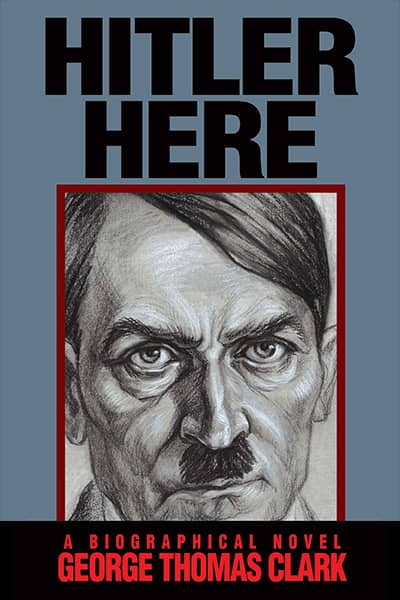A Jewish Girl in Nazi Germany
May 16, 2007
During the Los Angeles Book Fair at UCLA in late April, sun-splattered readers roamed by the thousands, and scores stopped by Tent 106 to talk to three other authors and me about our books. Mine is called Hitler Here. It’s a biographical novel, and the cover bears a menacing, pencil portrait of the man in the title. A stout woman in her late seventies glared at the book but didn’t touch it.
“It’s historically accurate,” I said. “All the characters have bylines and tell their own stories.”
Looking at me about like she did the guy on the cover, the woman said, “I have no interest in your book. I lived through it, and I’m Jewish.”
“Really? That had to have been difficult. And fascinating.”
“That’s right. I’ve written an autobiography called Midnight ‘til Dawn. I’m looking for agents so I can show them the manuscript.”
“How ‘bout an interview,” I said, reaching for paper to host the pen I already held.
“Too crowded. Here’s my business card and a two-page bio.”
A week later I called the woman once known as Hannelore Gollong. Her great grandfather, Gustav Schwandt, had been an eminent financier and part of the vanguard that built the Kaiser Wilhelm Canal connecting the Baltic Sea to the North Sea through northern Germany, and he moved in the nation’s highest social circles. Prestige does not insulate feelings, however, and his daughter – Hannelore’s grandmother – devastated him when she married a merchant marine named Gollong and became a chanteuse.
A generation later, healthy and bigoted in palatial retirement, Gustav Schwandt was appalled that his granddaughter, Irmgard, had been impregnated by a Jew. Even the wealth of Joseph Gruber’s family was irrelevant. The aristocratic Schwandt could not risk a scandal. Wielding the family finances with a clenched fist, he decreed that Irmgard be sent from the family cradle in Kiel, on the Baltic, to a sanitarium tucked into the Harz Mountains where Hannelore was born in 1928.
“The first thing I can remember, at age three or four, is living with a fat ugly witch,” said Hannelore. “I was sent from house to house to house. For a long time I only got to see my mother about once a year, and at first I wasn’t even sure if she was my mother. When I found out, I hated her. She was a beautiful woman but she’d left me behind, and of course I blamed her. I never did meet my father.”
Irmgard eventually married Hans Hoffmann, a buyer for a department store and a man acceptable to Gustav Schwandt. His great granddaughter, Hannelore, remained a family pariah and, in Hitler’s festering nation, a child in danger. In November 1938 the Nazis battered and burned hundreds of Jews and their businesses and synagogues during a Crystal Night of broken glass glowing under flames on the street.
World War II began in September 1939 and roundups of Jews intensified. The Nazis studied birth certificates and other public and private records as they spied and lied and forced neighbors and even relatives to do likewise. The Gestapo told the mother of Hans Hoffmann that she’d be in trouble if she was hiding any Jews. She said she wasn’t. They said they’d heard she was. She wasn’t but blurted her son was married to a woman whose daughter was a half-Jew and revealed where the girl might be.
One afternoon after class Hannelore walked down the school stairs and was stopped by a uniformed man with a pistol holstered on his hip.
“Come with me,” he ordered.
“Where?”
“To the office,” he said, grabbing her arm. He led her to his car and shoved her into the front seat.
While he drove he eyed the already buxom 11-year old, and after they’d passed all familiar points and were heading out of town the frightened girl asked, “Where are we going?”
“Quiet.”
In a field full of trees, the Nazi finally stopped and jerked Hannelore out and threw her on the ground and fumbled with his belt and pants as he pulled them down.
“Take off your underpants,” he said.
She complied, and he pulled her dress up and pounced.
“He was so big and fat,” Hannelore recently said. “I thought he was going to crush me, but he didn’t get very far. I reached for his holster and grabbed his gun and shot him, once, in the side. He slumped on me. It took awhile to get that pig off me. Then I ran back toward town. Did I tell anyone? God, no.
“I was able to move right away, and that saved my life. I found out later that my great grandfather was pulling strings to keep me as safe as he could. I knew I was Jewish but didn’t understand what that meant. I just knew I wasn’t loved by anyone. I felt worthless except for having a good body.”
Her grandmother, the former chanteuse, hosted her for a year in the central German city of Erfurt. Hannelore loved the old woman but their house was destroyed by allied bombs, and she had to move on to her mother’s stately residence in Elberfeld in the Ruhr where stepfather Hans Hoffman was ultimately able to purchase a forged birth certificate for Hannelore, providing theoretical safety.
“My mother was spoiled and treated me like the maids,” Hannelore said. “They were a lot nicer to me than she was, so I befriended them. And she said, ‘Don’t make friends with the maids. You’re not supposed to cross that line.’”
Hans Hoffmann served the German Army in a logistical capacity, and when he was away his enchanting wife hosted parties and sometimes visited male friends in Berlin. Once, Hoffmann called when Irmgard was absent. Hannelore tried to make excuses but could feel his suspicions. After he returned on leave he confronted his wife, asking, “Are you having an affair?”
“No,” she said.
Hoffmann turned to Hannelore and asked, “Has your mother been seeing men?”
“No,” Hannelore said.
Hoffmann slapped her face: “Liar.”
Irmgard stepped in and put her arm around him and took him into the bedroom, and the next day the couple came out smiling.
Good times were rare. Allied bombs destroyed about sixty percent of the town. Germany was crushed. And Hannelore Gollong wanted out. Her curvaceous figure helped secure a job with the occupying forces of the United States. She met a GI named Everett Yates, married him, became Honey Yates, moved to Kentucky, was called a Kraut and a Jew by his parents, bore two daughters and a son before he deserted her, worked as a waitress in Miami and a music talent scout in New York, married singer Trini Lopez’s road manager, Allen Lerner, divorced him because of his compulsive gambling, became a venture capitalist, and after more than 30 years returned to Germany to visit her mother dying of cancer.
“Why didn’t you want me when I was a little girl?” Honey Yates asked.
From her hospital bed the old woman laughed and said, “We had to get you away so the authorities wouldn’t find out. You kept trying to join the Hitler Youth because all your friends were in it.”














